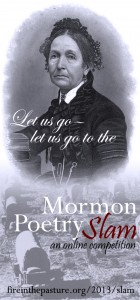Poet Highlight: Eliza R. Snow, “Song for the Camp of Israel— Let Us Go”
Eliza R. Snow (1804-1887) was the Latter-day Saints’ first and only official Poet Laureate. Joseph Smith dubbed her “Zion’s poetess,” a title under which she “penned numerous hymns, occasional verses, and theological poems that,” as Edward Whitley observes, “established for her a position of authority that extended beyond her status as a poet” (ref). So in addition to her place as “poetess” for her people and because of her great influence in the emerging religion, early Mormons also considered her “the high-priestess of the Saints,” to borrow the designation that Fanny Ward Stenhouse applied to Snow (ref). Beyond her place of honor among the Saints, though—or rather, because of the unique vision she had for God’s kingdom and for America and because of the influence she had in the Church, Snow was among a small group of 19th century poets that Whitley calls “unlikely candidates for national poet” (ref). His shortlist includes Snow, James M. Whitfield, John Rollin Ridge, and (of course) Whitman.
Not many Mormons, I think, know about Snow’s reputation and remarkable poetic output. However, most would probably know her for the poems she wrote that were written as or that now exist in the form of hymns, including the ten that are included in the 1985 LDS Hymnal. The most prominent of these is “O My Father,” which was originallyThe Indian Hunter by Henry Russell titled “My Father in Heaven,” then “Invocation, or The Eternal Father and Mother.” Among other things, the hymn is a moving witness of the Divine Feminine and our Heavenly Parentage and potential. She didn’t just write hymns, though. As a pioneer leader, she also wrote trail songs, several of which were titled “Song for the Camp of Israel.” Several of her trail songs were meant to be sung to “Indian Hunter,” a tune composed by Henry Russell (ref):
Snow’s “Song for the Camp of Israel— Let Us Go” was one of these trail songs (ref). It calls God’s people to movement: away from a corrupt society and government to a place of refuge and, ultimately, of salvation. The repetition of “Let us go” with each verse (the phrase appears 17 times in the poem) would make the song catchy and militant, almost, in its call for Israel to seek for a better community. When I first read the poem, I thought the repetition would make it a good performance piece; it was meant to be sung, after all. It’s interesting to read the poem against the backdrop of America’s current social and political conditions (about which I won’t comment).
On a lighter note, I also think the poem serves as a nice call to join me for the Mormon Poetry Slam. To that end, I’m drawing upon Snow’s authority as Zion’s poetess and as candidate for national poet to stir people to participate in the slam.
So: here she is calling us to go.
And here I am echoing her refrain.
Eliza says, “Pass it on.”


Pingback: Clinton F. Larson on Poetic Craft: The Value of Making Excursions into Experience